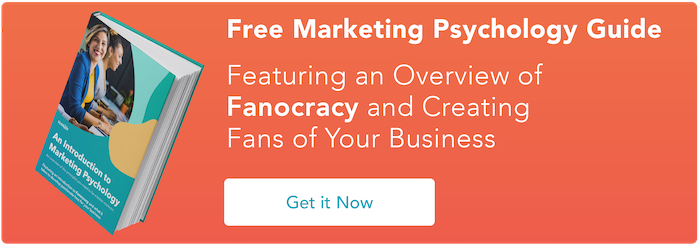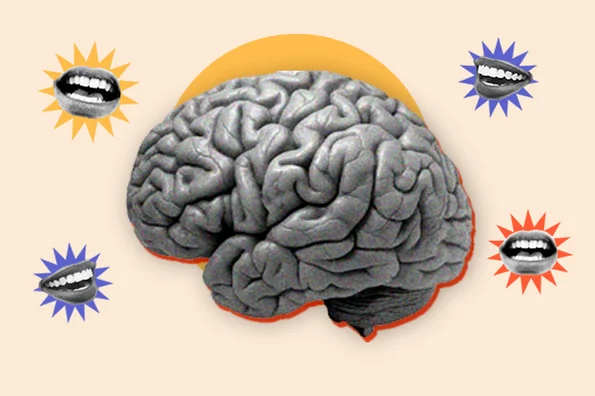Welcome to The Science Behind Success-- a new blog series that explores the best ways to help our brains perform better at work. With psychological research and interviews with leaders in the field, we're showing you how psychology can help you overcome workplace obstacles and excel in your career. Because a little mindset change could go a long way.

Oftentimes, it's easy to recognize the importance of personality on job performance.
For instance, let's say you work with an incredibly diligent, conscientious ad copywriter. She never arrives late to a meeting, rarely misses a typo, and is capable of performing extremely well independently.
Alternatively, your team manager is extraverted, passionate, and direct. She motivates your team during meetings, inspires you in one-on-one sessions, and finds job satisfaction through cultivating meaningful relationships with others.
Undoubtedly, these two people would likely perform less well if they switched roles, for personality factors alone.
At most workplaces, people's personalities are not left at the door -- instead, they are a key factor in whether someone succeeds in a role.
When you consider this, then, it makes sense why there's a rising field of study regarding personality as a predictor of job satisfaction and success.
To examine the concept of personality assessments as a recruitment and on-boarding tool, I spoke with Dr. Greg Barnett, who has a PhD in Industrial/Organizational Psychology, has consulted almost half of the Fortune 50 companies in the personality assessment domain, and is now the Head of Science at The Predictive Index.
Here, let's examine his take on the benefits of using personality as an indicator of job performance -- and how you might implement it in your own recruitment process, today.
The Benefits of Personality Assessments
It might seem like the concept of using personality as a job performance indicator is both new and unfounded by research -- in fact, neither are true.
Personality assessments have been around for a very long time. A quick Google Scholar search will show you plenty of research regarding personality and job performance dating back to the 1950's.
However, as Dr. Barnett points out, "It wasn’t until the early 1990's when two separate sets of researchers conducted meta-analytic research to find that personality had a more stable and generalizable relationship with job performance. It was the first time that research showed that certain characteristics really mattered for predicting job performance."
For example, Dr. Barnett told me the research showed Conscientiousness had the most consistent relationship with job performance -- which makes sense, when you consider someone who rates highly in the Conscientiousness trait is likely someone who is detail-oriented, and a rule-follower.
Research supports the notion that personality can be used as a job performance indicator -- which led to the realization that perhaps when companies hire, they should consider other factors besides hard skills when filling a role.
Nowadays, personality assessments are becoming increasingly popular as a method used during a company's recruitment and on-boarding process. Read on to find out the top four benefits of personality assessments.
1. Personality assessments can predict job performance.
Myers-Briggs, a questionnaire with the purpose of identifying someone's personality type, strengths, and preferences, is used by 89% of the Fortune 100 companies in the workplace for team-building exercises, or for leadership coaching.
Additionally, psychometric assessments are used by many major corporations, including Citigroup, Ford Motor, and JPMorgan. Procter & Gamble even uses its own P&G Reasoning Test to systematically assess a candidate's hard and soft skills, which enables the company to learn an employee's work habits, ability to work within time constraints, and more.
All of which is to say -- there's corporate support behind the notion that personality can be an indicator of someone's ability to do well in a role.
More than likely, this sounds true to you already. Imagine the variety of jobs that exist -- from writer, to computer programmer, to teacher, to designer. I'm willing to bet you know, based on your personality alone, that you would be happier, and excel more, in some of these roles over others.
However, Dr. Barnett notes the importance of using personality assessments as one piece of the larger puzzle -- "I believe the best use of personality assessments is part of a thoughtful talent optimization plan. That means thinking more broadly about the power of personality assessments and applying them not only for great hiring decisions, but to facilitate better team work, communication, and more."
2. Personality assessments can help identify team fit.
People typically don't work in silos in your company. In fact, quite the opposite. Oftentimes, you need incredibly different personality types and perspectives working together to produce the best work.
We've extensively explored the myriad benefits of diversity in the workplace before. Additionally, hiring based off personality can help your team perform to their highest degree -- for instance, in a room full of extraverts, you might miss something an introvert would've picked up on.
Dr. Barnett stresses this -- "What was once a salesperson … on their own has started to transform into a team-based approach, where a group of professionals all serve an important role in the sales process ... Those sales numbers are not just dependent on one person's effort, but instead really involve the interactive effect of many personalities. For this reason, I think personality assessments play a role beyond strictly predicting job performance. They should be used to hire for performance, but also for team fit."
Dr. Barnett is smart to point out that there's an important distinction between the word 'team' and the word 'group.' A group of people with highly specialized roles who each have their own objectives, and only rely on their colleagues for support and cooperation, is not a team.
"When it comes to true, high-performing, highly interdependent teams, the need to build a diverse team is important," he told me. "In this way, you are building a team that both compliments and supplements one another. When hiring for these types of teams, it becomes more of a balancing act."
If people within your department typically work in specialized and independent roles, a personality assessment might not be as critical. However, if you're hiring for a role that functions interdependently within a team, a personality assessment might enable you to build a stronger, more diverse team.
3. Personality assessments can ensure a better on-boarding experience.
An often overlooked aspect of the hiring process, on-boarding can help you increase retention rates and overall employee job satisfaction. However, a good on-boarding process is going to look vastly different for different people.
Dr. Barnett told me, "A smart on-boarding program would be tailored to individuals on the basis of their behavioral drives, needs, and personality. In that way, you could give them the right experiences early on and make that great first impression."
He continued with a few examples -- for instance, let's say you know your new employee is extraverted. To make them happiest, perhaps you should immediately get them around a group of people and begin introductions. However, if your employee is introverted, it might be better to give them time to settle in.
Alternatively, let's say your new employee is a take-charge type of person. You might let them pick the lunch spot, or get their voice heard early in meetings.
Additionally, as a manager, you can use the information gathered in a personality assessment as an opportunity to learn your new employee's conversation and work style and how they'd like to be managed. By understanding early-on your similarities and differences, you're able to ensure a smoother transition into a productive manager-employee relationship.
Ultimately, Dr. Barnett told me, "Smart on-boarding is both an opportunity to do something structural (the right experiences tailored to the right person), but also create self-awareness for the new employee and everyone that they work around so they all have a better opportunity of working better together."
4. Personality assessments can help you motivate others.
I often find motivation through positive feedback -- the more I'm told, "You did great on this project," the harder I want to work on the next one.
Alternatively, I have a coworker who is fueled by constructive feedback. When she's told, "You could've done better on this," she's energized, and takes the feedback and runs with it.
Ultimately, our personalities influence how we like to be motivated -- so you might use personality assessments as a clue into how you can motivate and inspire each employee.
Dr. Barnett supports this notion -- "Performance is part ability (including personality) and part motivation (employee engagement, manager approach, rewards, etc). So to really get those things right, it is about hiring right, but it is also about motivating right. Smart companies who use personality assessment results to understand their people, their drives, motivations, and values, can really use that to tailor their work experience to them."

How to Use Personality Assessments as Part of Your Recruitment Process
More than likely, not every position at your company will require personality assessments. As Dr. Barnett told me, "The more jobs are personality dependent, the more personality assessments will predict job performance. [However], if people work in a situation that constrains their personality a lot -- think really high structure, not a lot of autonomy, tons of repetitiveness … in these cases, we may not see personality as strong of a predictor."
If you think you might have a role that is personality dependent, here are a few steps you can take to implement personality assessments into your recruitment process:
1. Hire for the role, and define personality-based demands of the job itself.
Whether or not you want to implement personality assessments in your recruitment strategy, you still need to focus on hiring for the role.
Hiring for the job, first and foremost, is a necessity legally. As Dr. Barnett urges, "If an EEOC challenge were ever to arise, the law is about showing that your assessment is a requirement to do the job and requires statistical evidence."
However, there are benefits to including personality assessments in your recruitment strategy -- it can help you narrow the candidate pool, making the hiring process more efficient for your recruiters, HR team, and hiring managers.
Additionally, personality assessments could help ensure you hire a candidate who will be both professionally and personally happy in the role.
To do this, Dr. Barnett advises you start by defining the behavioral and personality-based demands of the role to ensure you're truly hiring for suitability to do the actual job -- not just because you like certain personality traits.
Additionally, there are multiple options, of varying levels of commitment, when considering implementing personality assessments.
For instance, you might ask people familiar with the role to complete a personality-based job analysis tool. "In this way," Dr. Barnett said, "We are having people who know the job really well identify the characteristics needed for success in the role -- and doing so in a systematic way. For example, with multiple experts you are able to remove some of the individual biases and errors that a single rater would have, and that helps to arrive at a better job profile."
Additionally, and often done in-conjunction with the personality-based job analysis tool, you might look at the highest performers vs. lowest performers in the role. Then, incorporate aspects of the highest performers you'd like to find in candidates -- for instance, perhaps you find your highest-performing customer support representatives are incredibly self-motivated. To find future top performers, then, perhaps you include that description in the job profile.
Finally, to most rigorously test personality fit, Dr. Barnett mentioned a process called criterion-related validation, where people already in the role complete the personality assessment, and those scores are compared statistically to job performance, including supervisor ratings and more objective data like sales numbers.
2. Screen potential hires with personality assessment tools.
"One of the best practices I've seen in using assessments," Dr. Barnett noted, "is to use them early in order to screen or sort candidates first. The purpose of all pre-employment selection tools is to increase the odds of a good hire -- and, in many cases, the earlier you use an assessment the better you achieve those odds."
Of course, if you choose to use personality assessment tools for screening purposes, it's critical you create a systematic, unbiased approach. You'll need to test each candidate's personality using the same questions and criteria, and ensure that the personality traits you're testing are truly applicable and necessary for the role.
For instance, you might want to see if a candidate is a good multitasker. You can test for this trait fairly throughout the screening process.
3. Use the personality-based results in the interview itself.
Dr. Barnett told me, "Once [your] pool is narrowed down to generally equally qualified candidates, it's very important to start thinking about things related to their communication, decision-making, and execution style and how that will help or hinder the team. I think this is best done by using the personality-based results during the interview to probe more specifically."
"There are a lot of ways to do this, but the goal is to start to get to the next layer of the candidate's personality -- moving away from the scores and towards the subtleties."
Ultimately, there are already plenty of interview methods you can use to ensure the candidate's personality, as well as her strengths and weaknesses, are a good addition to your team -- the STAR interview method, as one example.
You might choose to supplement your standard role-related questions with questions related to personality and performance. For instance, let's say you're hiring for an Account Manager role and have found "creative thinker" to be a major indicator of success in the role. You might ask your candidates, "In what ways have you used creative thinking in your past roles to succeed on a project?"
Personality and Motivation to Influence Job Performance
Although there's been plenty of research to support the notion that there's a correlation between certain personality traits and performance, there hasn't been as much research that explores the why -- although the most popular explanation is motivation.
There are three motivation factors that are thought to be critical links between personality and the workplace: 'striving for success', 'striving for communion' -- which Hogan (Hogan and Shelton, 1998), describes as "getting ahead" and "getting along" -- and the desire for 'personal excellence'.
You might use motivation, then, as the final piece to the puzzle. First, because personality can influence intrinsic motivation. Second, because there are extrinsic motivations that vary depending on the role.
For instance, my personality makes me inherently a "getting along" type of person. Sales, however, largely requires a "getting ahead" mentality -- which, in many instances, contrasts with my desire to "get along". So, while my personality alone doesn't make me 'unqualified' for sales, my personality is less inherently linked with the motivations that drive top sales performers.
Of course, I could overcome those challenges if need be -- we all could. But if personality can be used as a tool for recruitment, it can also be used as an assessment for your own happiness at work. If your role consistently requires you to act disingenuously, perhaps it's a sign you need to seek a role more naturally aligned with your personality -- which will make you happier, and more successful, in the long-run.
Disclaimer: HubSpot doesn't use personality assessments in its recruitment process. Ultimately, if you choose to use a personality assessment as part of your recruitment process, it's critical you use it systematically, make sure you're hiring for the role first, and use it as a supplement to your overall strategy -- otherwise, you risk becoming biased and unfair in your recruitment process.






![How Neuromarketing Can Revolutionize the Marketing Industry [+Examples]](https://www.hubspot.com/hubfs/neuromarketing_1.webp)



